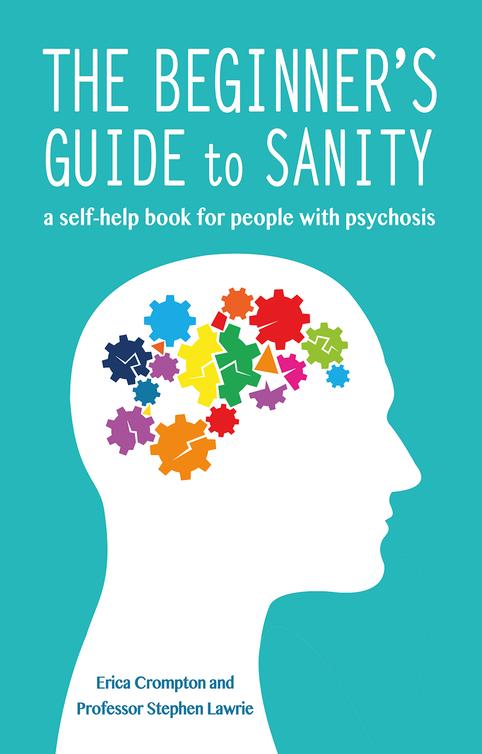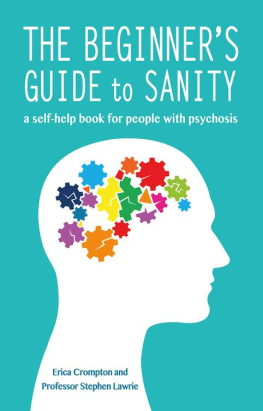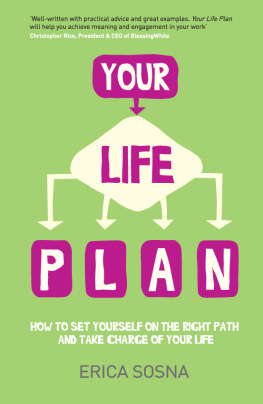Erica Crompton - The Beginners Guide to Sanity
Here you can read online Erica Crompton - The Beginners Guide to Sanity full text of the book (entire story) in english for free. Download pdf and epub, get meaning, cover and reviews about this ebook. year: 2020, publisher: Hammersmith Books Limited, genre: Home and family. Description of the work, (preface) as well as reviews are available. Best literature library LitArk.com created for fans of good reading and offers a wide selection of genres:
Romance novel
Science fiction
Adventure
Detective
Science
History
Home and family
Prose
Art
Politics
Computer
Non-fiction
Religion
Business
Children
Humor
Choose a favorite category and find really read worthwhile books. Enjoy immersion in the world of imagination, feel the emotions of the characters or learn something new for yourself, make an fascinating discovery.
- Book:The Beginners Guide to Sanity
- Author:
- Publisher:Hammersmith Books Limited
- Genre:
- Year:2020
- Rating:5 / 5
- Favourites:Add to favourites
- Your mark:
- 100
- 1
- 2
- 3
- 4
- 5
The Beginners Guide to Sanity: summary, description and annotation
We offer to read an annotation, description, summary or preface (depends on what the author of the book "The Beginners Guide to Sanity" wrote himself). If you haven't found the necessary information about the book — write in the comments, we will try to find it.
The Beginners Guide to Sanity — read online for free the complete book (whole text) full work
Below is the text of the book, divided by pages. System saving the place of the last page read, allows you to conveniently read the book "The Beginners Guide to Sanity" online for free, without having to search again every time where you left off. Put a bookmark, and you can go to the page where you finished reading at any time.
Font size:
Interval:
Bookmark:

Erica Crompton is a freelance journalist with a history of paranoid schizophrenia and over two decades experience of living with psychosis. Shes written about her life with this condition for The New York Times, The Lancet Psychiatry, The Mail on Sunday, The Guardian, The Independent, HappifulMagazine and many more. She holds a degree in journalism and a degree in fine art. As well as writing about psychosis, Erica gives guest lectures across the UK about her life, including talks to NHS clinicians, lawyers and solicitors, and doctoral students in psychology. In her spare time Erica runs Hopezine, a small and inspiring magazine to give all people feeling low or suicidal hope for a brighter future. She currently works part-time and lives in a little white cottage in a village in Staffordshire, UK, with her two adopted Tom cats called Caspar and Winter.
Professor Stephen Lawrie is a Professor of Psychiatry at the University of Edinburgh, UK, and an Honorary Consultant Psychiatrist at the Royal Edinburgh Hospital. He is a Fellow of the Royal College of Psychiatrists, the Royal College of Physicians (Edinburgh), the European College of Neuropsychopharmacology and the Royal Society of Edinburgh. Since 2014, he has been a Beltane Fellow for Public Engagement in Science. Until recently Stephen was Head of Psychiatry at the University of Edinburgh, Director of the Scottish Mental Health Research Network and Director of the Medical Research x Foundation and Medical Research Council-funded UK Clinical Research Training Fellowship programme for Mental Health (PsySTAR). As a practising clinician and clinically oriented researcher, Stephen is interested in clinical applications of brain imaging in psychosis, with a view towards objective diagnostic aids in psychosis and psychiatry, and in the development of novel treatments that might enhance outcomes in patients with established psychoses and possibly even prevent the onset of psychosis in high-risk populations.
Erica and Stephen would like to thank everyone who has been involved in getting this book prepared, edited and published. Special thanks go to the people who gave accounts of their own and others illnesses. Thanks also to Dr Lexie Pittock, the editor Carolyn White, and Georgina Bentliff at Hammersmith Books, who read drafts of the book and gave very helpful feedback.
The cops are hotly chasing you, about to whisk you off to high security prison. Youll have to face the media circus that is waiting outside your work an NHS centre for children in Stafford where you are a receptionist. You cant yet see them, but theyre there.
The signal you know this is about to happen is a technician who has come to record the ordeal by inserting cameras into the fax machine beside you. You feel pure terror. Its 2003; youve been following the Maxine Carr story in the newspapers and feel you are Britains next monster.
Your friends, along with a few celebrities, including pop star Rachel Stevens, are terrorists. They send messages to their victims through songs on the radio (such as Sweet Dreams my LA Ex) and subtly plant messages to you via storylines on TV programmes like EastEnders.
You are convinced you are a terrorist target. No one ever suggests you might be unwell, because you keep the thoughts to yourself. But every day you feel the panic and weight of being a wanted fugitive.
Youre just 23 years old, and shortly after the above takes place, you are referred to a psychiatrist. It is then you discover youre not a wanted fugitive at all. Instead, you have psychosis.
Psychosis can be a scary word, sometimes even for those diagnosed with it.
In The Beginners Guide to Sanity, Erica Crompton, a journalist xii with a history of paranoid schizophrenia, and Professor Stephen Lawrie, an academic psychiatrist, share what they know about psychosis. Whether youve just been diagnosed and are looking for relatable stories that will help you feel less alone, or are further into the course of your illness and wish to explore causes, diagnostics or why this might have happened to you we discuss what we know about this complex illness and what we can all do about it.
To start, we look at what psychosis actually is. Erica shares her experience of a first episode of the illness, before it turned into a full-blown schizophrenia diagnosis. And Stephen looks at the symptoms and illnesses that hes seen in his clinic during his career as a psychiatrist. Following on, in Chapter 2, Stephen goes into detail about each of the psychotic diagnoses what they are, and what each diagnosis means. Throughout, Erica provides quotes and colourful anecdotes from others and from her own direct experience of almost two decades of living with, and managing, psychosis.
If youre wondering why me? youre not alone. In this book we look at what causes psychosis and why people have this illness. We look at causation in Chapters 3 and 4, including all the main factors contributing to the development of psychosis. Erica also asks why me? and questions why she became ill. Chapter 5 then deals with what the chances are of different outcomes of psychosis.
So now, after reading those chapters, you have some idea why you or a loved one has psychosis, and what are you going to do about it. In Chapter 6, we look at how to manage someone who is acutely psychotic, and in Chapters 7 and 8 we discuss how treatment with medication and a whole host of other non-drug approaches can help to keep people well.
Chapter 9 deals with particular problems, largely from a psychiatrists perspective, which is followed in Chapter 10 by stuff about how to make the most of life in which Erica details xiii all the weird and wonderful treatments she has tried to manage her condition (from gardening to listening to hip hop!) and we both consider the other approaches you might try.
We finish off this journey through the psychotic mind and what can be done for it by looking at the books and films you can read or watch or recommend to family and friends to foster a greater understanding of what psychosis is and how it fits in the wider world today. We also recommend organisations that specialise in mental health to get in touch with if youre struggling many will have their own helplines that you can call in a crisis.
So, put the kettle on and lie back on the psychiatrists couch as Erica and Stephen start to relay everything they know about psychosis or, at least, everything we think you might want or need to know

Psychosis literally means out of touch with reality.
When mental health workers use the word psychosis, it is usually because the person they are seeing has one or more psychotic symptoms. These are usually delusions (bizarre beliefs) and/or auditory hallucinations (hearing voices). A diagnosis of a psychotic disorder (or condition) is usually only made if the symptoms are distressing or interfering with everyday life, but it often also means that the person does not realise that they are ill in other words, in psychiatric jargon, they lack insight that their experiences are products of their mind rather than real.
For Erica, psychosis is one of the worst things ever to happen to her, mostly because losing touch with reality almost cost her her life. She says:
It is the bizarre beliefs that Stephen describes which led me to A&E in the spring of 2009. Id been doing okay since 2003 but around this time I had stopped taking my medication for longer than a week and had started to believe I was a wanted criminal again. Back in that sunny springtime of 2009, I had no insight at all and I wasnt taking illegal substances just to get high. My poison was a bottle of bleach, to drink, in order to end my life. I did this at a time when my beliefs were fixated on my being a criminal and the psychosis really took hold after about seven months without medication, and after about two weeks of intense stress (moving house and being in debt).
Font size:
Interval:
Bookmark:
Similar books «The Beginners Guide to Sanity»
Look at similar books to The Beginners Guide to Sanity. We have selected literature similar in name and meaning in the hope of providing readers with more options to find new, interesting, not yet read works.
Discussion, reviews of the book The Beginners Guide to Sanity and just readers' own opinions. Leave your comments, write what you think about the work, its meaning or the main characters. Specify what exactly you liked and what you didn't like, and why you think so.













